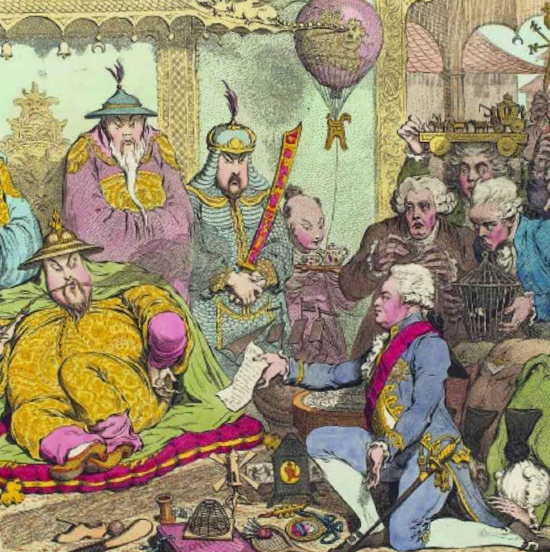About Canadian Patriots, China, History, and the Drug Trade
They are available as critics of financial capitalism. So, they can be useful when other criticisms are not so available. There are other criticisms of Financialism from an authentic left perspective, but they are not as well funded, and often heavily suppressed.

There is a need to write something short about some things which are written too long.
For awhile now I have had it in mind to write something about the firm of Matthew Ehret and Cynthia Chung. They write voluminously through their platforms of “Canadian Patriot” and “Rising Tide Foundation”. My motivation to start it now is the article Cynthia wrote in Substack about the drug crisis in Vancouver, Canada, and what is really behind it.
She actually wrote something readable about the growing drug and homeless problem in Vancouver. However, she used it as the lead-in to their overly long series explaining the international drug business, going back to Noah’s Ark and in great detail.
No, the People’s Republic of China has nothing to do with the present global drug problem. But neither does the British East India Company and the Opium wars with China. Cynthia refutes the former well enough but seems to be implying the latter.
The first big problem with these people’s writing is that they have a severe case of footnote disease. They also want to write entire books over the net. I wish someone would teach them to start with an introduction and end with a conclusion.
The second problem is they are not really valid in where they are coming from. They have some good information about the financial capitalist oligarchy. They see the various kinds of occult and quasireligious behaviors behind this power.
However, they seem to be merely propagandists for a different faction among western economic elites. I am not sure if they fully realize it. That is, the industrial capitalists; the people behind the “International Democratic Union” and other neofascist impulses.
These are the people enamored with the idea that there can be infinite growth on a finite planet. We can have “superabundance” if all these conspiratorial people get out of the way.
The two Canadian Patriots also seem to adhere to religious conservatism. They see the conflict between civil society, and the financial oligarchies and the cult type groups they work through, in Manichean terms of a war between God and Satan. They also think being a ‘patriot’ is a good thing.
I have noticed a new faction emerging from the industrial capitalists in the English speaking world. The old type was very libertarian. Everything to do with government and maintaining civilization was interfering with their freedom, was communistic, and so on.
There is a new movement emerging among such people which is not so hung up on government or even “communism”. They even accept the idea that the currency needs to be issued by government through a public bank. Amazingly, they admire at least some aspects of Communist China, although I do not think the Chinese Communist Party are as impressed with them.
Ehret and Chung seem oriented to this group. The Rising Tiders are still hung up on the very bad idea of constant growth whether there is any purpose to it or not. They support ridiculous ideas like nuclear power, fusion power, and genetically modified crops.
They throw around the word ‘freedom’ a lot, but their ideas do not seem to align with real freedom. They do not seem interested in the development of real democracy. That they seem to see public health measures, especially as related to airborne disease, as an infringement on ‘liberty’, is another big bell ringer.
In the near future, I want to deal with the economic ideas Ehret has, particularly of open versus closed economic systems. I want to show how this fits with the neoFascism rising in the world, and how that comes from the industrial capitalists and their new organization, the International Democracy Union, IDU. That is for another blog post.
In this post I briefly discuss Cynthia Chung’s ideas about the narcotics business. Then, the basic flaw in her methods of analysis and in the way she communicates.
Cynthia wrote about the growing tent city problem in her home city of Vancouver. That town has the worst homeless and drug problem in the country. That is a big reason why I went to Toronto instead.
Part of the problem is that the Province of British Columbia is the social dump ground for the rest of the country. Canada tilts slightly to the west. The loose nuts the other provinces do not want to take care of roll to the west coast. B.C. has no choice but to take them in.
Cynthia correctly identified one part of the problem; the ideological liberal idea that drug dealing, drug addiction, and homelessness are not a problem to be eliminated. It is just the way some people are. It is a subculture which has to be tolerated and accommodated.
It is true that the reason people stay homeless is usually that they have substance abuse problems. Often they develop substance abuse problems when they become homeless and cannot get out of it. However, they also, most often, have such problems because they are mentally ill and there are no places for them where they can get treatment or protection.
Cynthia correctly identifies that the big factor maintaining the drug problem is that addicts are very profitable. A narcotic industry is also a good tool for breaking down societies. Cynthia will explain that element of it in detail; very great detail.
She identifies that the Liberal idea of safe supply and safe injection sites does not really solve the problem. But she also gets into this social conservative idea that forcibly treating addicts will solve the problem. As with many social problems, there are conflicting ideological takes on the cause and solution, and then there is the real cause and solution.
The key thing to understand is that addictions are not the cause of social breakdown. It may accelerate breakdown, but social breakdown is the cause of most addictions. As well, safe injection and safe supply sites are a pathetic crisis solution to the problem, but they keep people alive.
Forced treatment has never solved addictions and never will. Until the pain which is causing their addictions is remedied, people will be readdicted as soon as they hit the streets again. The only thing which will reduce the number of addictions is to address the ills of a dysfunctional society, which breeds addictions.
Until then, the best way to reduce the harm of addictions is to simply provide people with a safe supply of the drug. For some reason, it is a big secret that addictions are temporary. After a period of time, usually ten years for Heroin, the drug no longer has any effect. The addiction has burned itself out.
Further, people can usually hold down jobs while addicted if they have a safe supply of the drug. That is assuming the mental problems which got them addicted are dealt with. No, Cynthia, Methadone treatments do not merely trade one addiction for another. It trades a more harmful addiction for a less harmful one.
There is one big problem with treating addictions this way. The drug trade is very profitable and, to repeat, serves a purpose for the nefarious hegemony which maintains it. Cynthia knows what this industry is about but does not quite make the connection with keeping Heroin and similar drugs illegal.
Drugs are profitable because they are illegal. If the traffic was legalized, the stuff would cost ten cents a hit. There would be no money in getting people hooked.
Cynthia seems to miss some other important information. She thinks the drug problem only started in the sixties when the globalist empire was building its new control mechanism of “national intelligence networks”. They had trouble keeping the budgets of these agencies, theoretically branches of government, secret.
They decided to build the drug racket in part as a source of the black funds to run the “off the books” activities of these agencies. Also, for other nefarious projects they wanted to operate. To do this they had to make addiction profitable by making it illegal.
Cynthia is evidently unaware that we had a huge drug problem in the English speaking world up into the twenties. It was then usually legal to sell Opium, Coca, and other precursors of modern narcotics.
Then, we got some enlightened policies. Narcotics were banned or tightly controlled. Yet addiction was still treated as a medical problem and prescriptions were written for these narcotics. This largely eliminated drug trafficking for that time.
Then in the post war times the globalists employed public relations firms to create moral panics against addicts, leading to their criminalization. Addicts were bad people who needed to be punished for being wicked. This lead to an explosion in the numbers of addictions.
Since this new drug trade has developed it has been very hard to shut it down again. There are now billions in profits from this trade, which goes to fund very powerful people. As well, there are large and self perpetuating bureaucracies built out of the “war on drugs”.
So back to the China connection. Cynthia seems to think there is a direct connection between the opium wars and the opium trade into China during the eighteenth century, and the modern drug trade. There is not.
Both historic phenomena were operations of Anglosphere financial imperialists, but different groups in different eras, in different parts of the world, with different methods, and different aims. That is, aside from making money. The capitalist factions which see China as an enemy, promote the ridiculous idea that the current North American drug crisis is China’s revenge for the Opium trade. Cynthia dutifully refutes that, as if it really needed any answer.
This is the big problem with Matt and Cynthia’s analysis of things; they are convinced there is some original cause to all these things. Cynthia’s husband and collaborator revealed this in an interview I watched. He thinks there is some guiding force directing this all down history to oppose and defeat Christianity.
Of course this force would have to be supernatural. These people are not overt about their religious obsession. It would destroy their credibility with most people. But it is there in the background.
So they focus on the western financialism and imperialism which developed in the past five centuries. They focus on the cult-like movements which tend to be wrapped up in it. They oppose it from the perspective of Christianity and productivist economic ideas.
‘Productivist’ is another word for ‘growthism’ or even ‘protestant work ethic’. It is the idea that production must grow for the sake of growth. We must have infinite expansion in a finite world, with no relation to actual needs, or available resources, for no reason except ‘growth’.
There is a lot of money behind promoting this notion. This money wants to displace the financialist hegemony which has been the dominant form of capitalism in recent centuries. Matt and Cynthia, and their ‘Rising Tide Foundation’, are getting a lot of money from somewhere to do their gig.
Thus, they are available as critics of financial capitalism. So, they can be useful when other criticisms are not so available. There are other criticisms of Financialism from an authentic left perspective, but they are not as well funded, and often heavily suppressed. So they are less available.
Rather than the “satanic cults rule the earth” perspective, these leftist critical theorists can take a more sociological approach to the study of oligarchy. They do not try to deny that there are powerful families which transmit that power over many generations. What they do is to scientifically study the mechanisms by which that hegemonic power transmits.
Geneological study shows that many of these families have persisted for centuries, some into the middle ages. However, in the Anglosphere most seem to have arisen with the industrial revolution.
So, ‘old money’ does seem to still rule. Many of today’s billionaires seem to think they are part of a new ruling class. Yet they do not seem to be as powerful as they imagine.
There are many questions to be asked about the power of oligarchic factions. What exactly are these factions and the relations among them? How does their internal government work? Are they declining in power?
Rising Tide foundation gives us no analysis. To them there is a satanic force which has persisted from the time of the Venetian Black nobility, or even the time of the Babylonian temples.
The present denizens of the ‘City of London’ would not be direct descendants of the Venetian Black Nobility. They may have admired and imitated, and improved on, the methods of these earlier oligarchs. They may have even studied the operations of the ancient Babylonian or Delphic oracles, but would have no linear connection.
Thus, the Rising Tide Foundation can give us some entertaining and enlightening historic stories. However, it gets very tiring after awhile. For much of it, I have read different versions from other, often more readable, sources.
I have already said they have a bad case of footnote disease. But footnotes are for books. Extreme footnotes are for academic papers. Footnotes do not belong on the net. I dislike footnotes in most instances, because I usually do not have ready access to the sources.
What I like to be able to do is read something over and make up my mind about it, or parts of it, in an abductive way. I think most intelligent people do. I decide if it holds together and fits with everything else I know about reality.
I watched Ehret snark once about people who thought he and Cynthia’s pieces were too long. No, he thought, our attention spans are too short. No, I say, they need to write better; also, shorter. We have other things to do than read you.
It is not so much that their stuff is too long, but that it is unskimmable. It needs to be introduced with an introduction and concluded with a conclusion. For long work, the sections need their own introductions and conclusions.
This way, I can go back and forth in the text, decide what each part is about, and can look at what is interesting to me. I might already know enough about the trope that the rituals of the Knights Templar are carried over into Scottish Rite freemasonry. I might instead want to know more about how the Scottish Rite was implanted in North America by the British army as a surveillance system over uppity colonials.
My conclusion is that Matt and Cynthia are very good researchers. They are good writers in a limited way, but really need an editor. They are not good at analysis.
Finally, they are really not so great as propagandists for productivist, neofascist, late industrial capitalism.




Comments ()